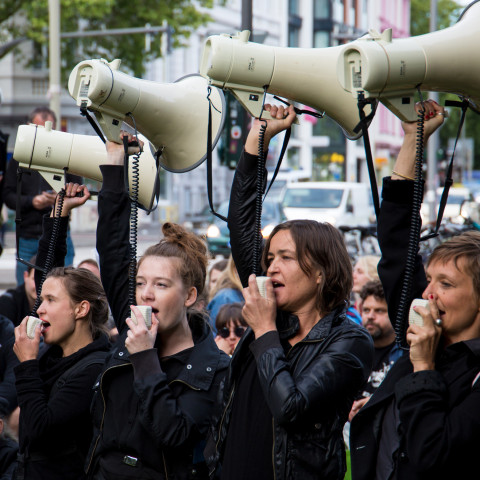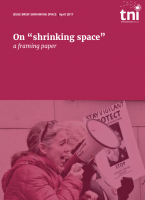What Happened in Hamburg Police and protests meet at the G20: a litmus test for freedom
Hamburg was a brave choice. Recent G20 summits have been hosted on remote islands or in castles deep in the countryside, out of the way of activists and media.

Rasande Tyskar / Flickr
Hamburg is a well connected city with a rich history of protest. Other cities that hosted G20 and G8 summits saw huge protests and state repression and violence. Genoa in 2001, Seattle in 2008, London in 2009 or Toronto in 2010 were the scenes of widespread arrests and injuries. A protestor died in Genoa. Policing methods introduced in London were later found to be unlawful. The mass arrests of demonstrators, bystanders and journalists in Toronto were strongly criticised by human rights organisations.
A new generation
The majority of the tens of thousands of people who headed to Hamburg wanted to demand international solidarity and to condemn wars and border-walls. They had a sobering stay in Hamburg. Many had no experience with earlier protests against the G20 and the G8. Even before the riots that followed the 'Welcome to Hell' demonstration, civil liberties and constitutional rights were stripped away. Faced with a police strategy of intimidation and harassment, people found themselves in a city under siege.
- An activist camp at the Elbpark Entenwerder was unlawfully closed by the police on Sunday. Police used pepper-spray during the eviction. At least one journalist was attacked by the police. source 1: EA , source 2 German public broadcaster WDR 1
- Police escalated the tension in the days that followed, mostly targeting local people participating in protest 'hanging around at corners'. Source German TV program Monitor, on WDR - 1 and German Tageschau main news:
- People who tried to reach Germany through the Netherlands were stopped, their passports confiscated, bags searched, and although nothing was found, buses were sent back; demonstrators were forced to sign statements that they would not travel to Germany in order to get their passports back (Source: Dutch TV program Een Vandaag.)
- Many other international activists traveling to Hamburg were held at the border and sent back. A bus transporting several German youth groups was stopped, half the people were strip searched and prevented from contacting lawyers (source: Hamburger Abendblatt).
- The police used new gear: armored vehicles, helicopters, and brand new three meter high water canons.
- Police inflated the number of officers that were injured during the protests. The first number, 479, was later debunked but not officially corrected. 95% of those injured could continue their work after on-the-spot treatment.
- Journalists who fact-checked police estimates of injuries calculated that roughly 234 officers were reported wounded. This number includes approximately 130 police officers from Hessen that reported injuries as a result of teargas, most likely caused by the police themselves. (Sources: Buzzfeed, Hessische Rundfunk, TAZ, Zeit TagesAnzeicher & Marx 21)
- Journalists reporting on protests were already targeted on Sunday (source Monitor), a pattern that continued in various forms throughout the week, with targeted attacks (Source: Frank Schneider, chefreporter NRW BILD zeitung) and criminalisation of journalists. (Source: ITN team ) Press accreditation for the official summit was taken away from several journalists, a move protested by the German Union of Journalists. Statement by DJV & Tagesschau and report by Deutschlandfunk.
- Stories continue to surface about police violence during the protests. The press reported heavy-handed policing during the non-violent direct action in the red zone (Source: MoPo) or in general about police violence. (Source TAZ.de ). Anti-terror police units removed street medics at gun point from an improvised field hospital and used a water cannon against street medics and the press (Source: Statement by street medics Berlin.) During a peaceful demonstration, police escalated the tension by attacking peaceful demonstrators. (Source : Perspektive TV). More documentation on police violence can be found here: https://g20-doku.org/
- Demonstrators who were arrested and lawyers assisting arrestees reported degrading treatment, neglect of medical care, even of injured protestors, and disregard for the right to legal assistance. Source: Anwaltlichen Notdienst
- All in all, human rights defenders were alarmed (source: Grondrechtekomitee, and Anwaltliche Notdienst.)
Escalation is dangerous - Solidarity is necessary
Support structures, journalists and lawyers, as well as activists themselves were targeted. Authorities worked to control the narrative, using the escalating violence as an excuse to put the city under siege.
Activists were lucky to find themselves in a city with a long and proud tradition of solidarity. The people of Hamburg opened their doors, homes, gardens and churches when protestors looked for a place to sleep, shower or get medical treatment. But demonstrators can't be so fortunate to always count on the home advantage.
Hamburg as a litmus test.
Democratic space is shrinking almost everywhere. Civil society organisations are sounding the alarm. A wider pattern of repression is happening around the globe. More and more cities and countries see strategic campaigns to criminalize protests - including severe costs for individuals who dissent (jobs lost, arrests, emotional and physical intimidation) - curbs on freedom of speech, freedom of the press under pressure, as are the rights to peaceful assembly and protest.
Hamburg was not an isolated case, but rather a litmus test for our fundamental freedoms. For those outside of Hamburg this should serve as a sobering warning that democracy is under pressure from all sides.


